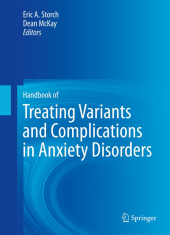 Neuerscheinungen 2014Stand: 2020-02-01 |
Schnellsuche
ISBN/Stichwort/Autor
|
Herderstraße 10
10625 Berlin
Tel.: 030 315 714 16
Fax 030 315 714 14
info@buchspektrum.de |

Dean McKay, Eric A. Storch
(Beteiligte)
Handbook of Treating Variants and Complications in Anxiety Disorders
Herausgegeben von Storch, Eric A.; McKay, Dean
2013. 2014. xv, 413 S. 6 SW-Abb. 254 mm
Verlag/Jahr: SPRINGER, BERLIN; SPRINGER NEW YORK; SPRINGER 2014
ISBN: 1-493-92166-5 (1493921665)
Neue ISBN: 978-1-493-92166-9 (9781493921669)
Preis und Lieferzeit: Bitte klicken
This handbook explains how and why clinical factors present challenges to clinicians treating clients with anxiety disorders. It offers a best-practices approach that helps readers choose current evidence-based options for treatment tailored to the individual.
As prevalent as anxiety is as a diagnosis, clinically complex cases are even more so. At the same time that it is recognized as a spectrum of disorders with many possibilities for intervention, it is most often seen with variations that further complicate treatment.
The Handbook of Treating Variants and Complications in Anxiety Disorders explains in clear detail how and why clinical factors present challenges to clinicians treating clients with these disorders. Comorbid conditions often found in children, adolescents, and adults with anxiety, including developmental disabilities and personality disorders, are analyzed in the context of treatment. Case examples and literature reviews illustrate the relative merits of integrated versus sequential treatment, the importance of prioritizing behaviors, age-related considerations, and therapist issues. This best-practices approach guides readers in choosing current evidence-based options for treatment that is tailored to the individual and effective in the short and long term. Included in the Handbook :
Prognostic indicators of treatment response for children and adults with anxiety disorders.
Treatment of comorbid anxiety and disruptive behavior in youth.
Treatment of PTSD with comorbid borderline personality disorder.
Limited motivation, patient-therapist mismatch, and the therapeutic alliance.
Assessment and treatment of comorbid anorexia nervosa and obsessive compulsive disorder.
Treatment of comorbid anxiety disorders across the lifespan.
Developed as a companion reference to the Handbook of Assessing Variants and Complications in Anxiety Disorders , the Handbook of Treating Variants and Complications in Anxiety Disorders is of immediate relevance to researchers, scientist-practitioners, and graduate students in clinical child, school, and developmental psychology; social work; psychiatry; psychotherapy; counseling; and pediatrics.
Eric A. Storch, Ph.D., is Professor and All Children´s Hospital Guild Endowed Chair in the Departments of Pediatrics and Psychiatry & Behavioral Neurosciences, University of South Florida. He holds a joint appointment in the Department of Psychology. He is Associate Editor for three journals: Child Psychiatry and Human Development, Journal of Cognitive Psychotherapy, and Journal of Obsessive-Compulsive and Related Disorders, and serves on the editorial boards of Journal of Clinical Child and Adolescent Psychology, Journal of Child Health Care, Psicologia Conductual, and Journal of Anxiety Disorders. He has published more than 300 peer-reviewed journal articles and book chapters and has given more than 250 conference presentations. In addition to his peer-reviewed articles, Dr. Storch has edited or co-edited three books dealing with treatment of complex cases in children, obsessive-compulsive disorder, and childhood anxiety. He has received grant funding for his work in OCD, related disorders (e.g., tics), and anxiety from the National Institutes of Health, Agency for Health Care Research and Quality, CDC, International OCD Foundation, Florida Department of Health, pharmaceutical companies, Tourette Syndrome Association, and National Alliance for Research on Schizophrenia and Affective Disorders (NARSAD). In addition to treatment outcome, Dr. Storch has specific research interests in treatment augmentation and dissemination. He directs the the University of South Florida Obsessive-Compulsive Disorder Program and is highly regarded for his treatment of pediatric and adult OCD patients.


